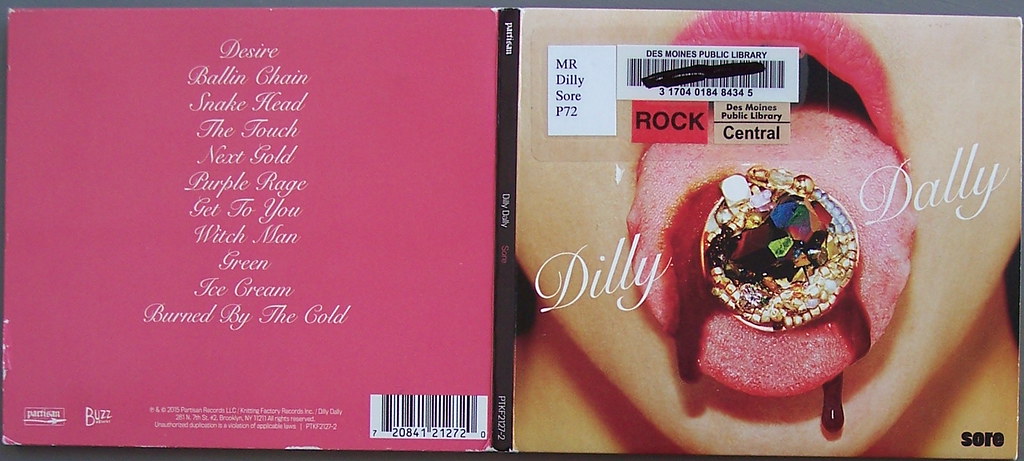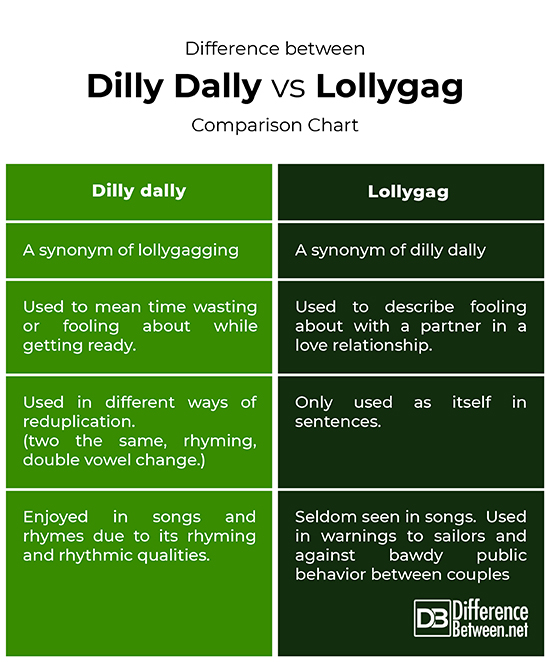Difference Between Dilly Dally and Lollygagging
Dilly dally and lollygagging are both expressions used in conversation to remonstrate about wasting time. They are used as synonyms of one another in the dictionary and they both mean someone is being annoying, because they are wasting time. However, they have different implications and origins. Dilly dallying is used more to denote someone who is perhaps disorganized and not attentive to the time being wasted. A person who dilly dallys wastes time by fussing around and not getting things done. They cause delays to others and are usually not aware of the delay they may be causing. Lollygagging takes on a different perspective of time wasting due to its origins and connections to love relationships. Lollygagging meant wasting time, lazing around with someone else, when there was work to do or duties to perform. Dilly dallying would indicate a trite waste of time while lolly gagging, a more old fashioned expression, was synonymous with elicit relationships and an inappropriate waste of time.

All about dilly dallying.
Dilly dally originates from the French word ‘dallier,’ meaning to amuse oneself slowly. It had flirtatious connotations originally. Dally today means to waste time and indulge in one’s own agenda without concern for others. A selfish attitude. The addition of dilly to dally is directly linked to doubling the word for effect. This is known as reduplication. There are many pairs of words that have been put together in this way. Reduplication makes the words poetic and even musical as they can be repeated in rhymes and songs.
How is dilly dally used?
- Language
Dilly added to dally makes the familiar expression we know as dilly dally. Dally is the root word of the expression and the added dilly is known as a literary device called reduplication. There are structures attached to the groups of words used in this way. The general effect is to make the reduplication sound nonsensical in some cases or to resonate better when pronounced.
There are three types of reduplication commonly used in the English language.
- Repeating the same word twice like – bye bye, chop chop or aye aye.
- Rhyming reduplication, sounds like these examples – easy peasy, fuddy duddy, jeepers creepers.
- Vowel change – clip clop, chit chat, zigzag, ding dong and riff raff, to name a few examples. There is an interesting pattern to see in these vowel change groups. The word with the vowel letter (i), always comes first in the partnership. It is not correct to say zag zig or dong ding for example. This is known as ablaut reduplication where the vowel with the higher sound is used first in the partnership.
- Songs and poems.
The well know song ‘My Old man said to follow the van, has dilly dally in the lyrics. The story behind the song is about a family that had to move house and all the goods were on the back of the van. The man’s wife was instructed not to dilly dally on the way as she had to walk behind the van. It meant she should not stop at a pub or tavern for a drink along the way. Well she did, and she dillied and dallied and lost her way home.
- Reprimanding.
Telling someone to stop dilly dallying is an affectionate way to ask them to hurry up and stop wasting time. A mother may tell her child to stop dilly dallying and get ready for school and not miss the school bus.

All about lollygagging.
Lollygagging means wasting time, just like dilly dally means to mess about and waste time. It originated from the word lally, which became lolly, and then lollygagging. Lollygagging was used to describe the way two people in love would act around one another. It went on to have rather immoral connotations. A report in an Iowa newspaper in 1868 referred to the word in this way:
“Lollygagging lumps of licentiousness who disgrace the common decencies.” It was an old fashioned way of referring to love making. The act of lollygagging was seen as a need for disciplinary action by the navy. It was mentioned by a naval captain, in 1946, as a strictly forbidden action by sailors. When sailors were off their ships and onshore they would be seen to be indulging in lollygagging. Wasting time with lose women while they were in the docks. The root word loll is to lie about. Lollygagging often referred to deviant sexual practices by the sailors with the ladies they spent time with.
How is lollygagging used?
- Language:
Lollygagging is not used as frequently as dilly dallying. It doesn’t roll off the tongue as gently as dilly dally. The under tone of lollygagging is more likely to be insulting and seldom used in connection with children, or families, wasting time.
- Poems and songs:
It is very difficult to find rhymes or songs using the word lollygagging. The comical picture of a lady following a van, after her old man, would not sound quite right if she ‘lollygagged’ along the way. Dilly dally has better rhyme and reason behind the word for use in poetry and song.
Differences between Dilly Dally and Lollygag
Linguistically:
Both of these sets of words are synonyms for one another. They are both verbs and used to describe an element of lazy behavior. One is easier on the ear and less offensive than the other. Although dilly dally and lollygagging mean the same, dilly dally is more in use in conversation today
Attributes:
Dilly dally has several attributes. Dilly dally can be reduplicated as a rhyming pair or seen as a vowel change. Lollygagging is a single word and does not fit into the reduplication category.
Traditional.
Dilly dally has its origins from the French word ‘dallier.’ Dallier was adopted into the English language as dally. It meant playing around or messing about. Lollygagging evolved from a traditional way of describing love making or fooling around romantically. It is reported to have been brought across to America by the Irish and pronounced lally.
Cultural.
The sweetness of dilly dally has been used in rhymes and children’s songs. Lollygagging is used more often to describe sexual relationships between men and women, and in particular sailors who have come ashore while the ship is in the docks to laze around and lollygag.
Difference between dilly dally vs. lollygag: Comparison Chart

Summary:
- Similarities:
The words are both verbs and used as verbs in sentences. They have similar meanings in their link with time wasting.
- Differences:
Dilly dallying has an air of innocence about the way it is used. It reprimands within the context of getting organized for something and as an irritation if the person who dilly dallys wastes someone else’s time. Lollygagging has more of a mocking tone and an irritation with young couples who may be behaving inappropriately in public. An old fashioned way of addressing couples and their romantic associations.
- Ways of expressing these sentiments:
Dilly dallying is expressed in children’s rhymes and folk songs used in a humorous way. It expresses irritation about time wasting, but in a light hearted manner. Lollygagging would not be a sentiment expressed to children or within the context of funny rhymes and songs. It was used during the war to remonstrate with sailors misbehaving on the docks.
- Depth of the emotion:
Dilly dally is lighthearted, and although negative in conveying an irritation, the emotion is one of mild annoyance. Lollygagging has an underlying derogatory implication of inappropriate sexual behavior in a public place.
- Traditions and customs.
Traditionally dilly dally is used by families and in front of children to encourage them to be more punctual or more organized. The expression could be heard anywhere from the school room to the home or any social environment. It is a customary remonstrate chiding adults and children in a lighthearted manner. Lollygagging has not received the same customary traditions and would be more likely to be associated with unacceptable behavior in public place between adults. It maybe used to make fun of some one. However, the real meaning of the expression makes it unsuitable for sharing within the realms of family life. Lollygagging would seem to be antiquated and old-fashioned and not really expressing the sentiment of dithering or wasting time innocently. Lollygagging is an out of date expression, seldom used in today’s literary world.
- Difference Between Lagoon and Bay - October 20, 2021
- Difference Between Futurism and Preterism - August 12, 2021
- Difference Between Dichotomy and Paradox - August 7, 2021
Search DifferenceBetween.net :
Leave a Response
References :
[0]Quinton Michael. World Wide Words investigating the English Language. Www.worldwidewords.org/weird words. 5/10/2017 pub. Michael Quinton.
[1]Quinton Michael. World Wide Words investigating the English Language. Www.worldwidewords.org/weird words. 5/10/2017 pub. Michael Quinton.
[2]Hurley Hall Sharon. Reduplication - double delight. Www.dailywritingtips.com April 2008. Pub. Daily Writing tips.
[3]Curzan Anne and Kruth Rebecca Racy Past Lollygagging. July 29th.2018 www.michiganradio.org/post/racy-past-lollygagging. Pub. Michigan Radio.
[4]Image credit: https://live.staticflickr.com/7850/39741210613_b0cee434ae_b.jpg
[5]Image credit: https://live.staticflickr.com/2938/14004575264_c266525912_b.jpg
